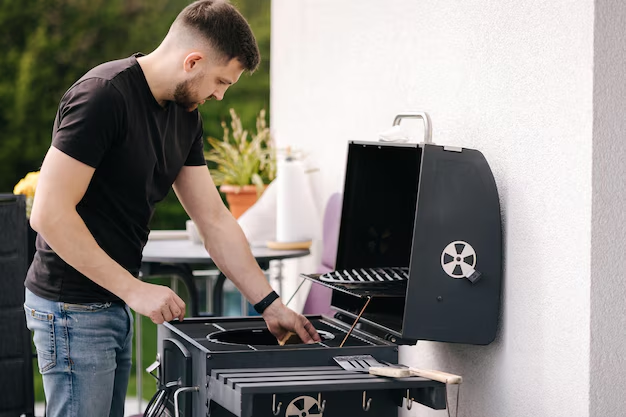Understanding LP Gas Refrigerators: How They Work and Why You Might Need One
Imagine heading off on a camping trip or living off the grid and still having the luxury of fresh food and cold drinks. It's not an extravagant dream, thanks to a nifty piece of technology known as the LP gas refrigerator. These appliances might not be as common as their electric counterparts, but they serve a crucial role for those seeking an alternative cooling solution. So, how exactly does an LP gas refrigerator work, and why would you choose one? Let's delve into the intriguing world of gas-powered refrigeration.
🔍 What is an LP Gas Refrigerator?
Before getting into the mechanics, it's essential to understand what an LP gas refrigerator is. "LP" stands for liquefied petroleum, commonly known as propane or butane. These refrigerators don't use electricity to keep things cold. Instead, they rely on a heat source—particularly a burning flame fueled by LP gas—to initiate a cooling process.
🔧 The Science Behind LP Gas Refrigeration
The Cooling Cycle
At the heart of an LP gas refrigerator is an absorption refrigeration system, a marvel of thermodynamics. Here’s a simplified breakdown of how it works:
- Heat Source: A small flame fueled by LP gas heats a solution of water and ammonia.
- Evaporation: The heat causes the ammonia to evaporate, separating it from the water and turning it into a gas.
- Absorption: As the ammonia gas cools down, it gets absorbed back into the water, which releases cold air into the refrigerator’s interior.
- Recirculation: The cycle repeats as the ammonia-water mixture circulates back to the heat source.
This closed-loop system allows the refrigerator to maintain a cold temperature without any need for electrical components, making it extremely efficient for specific use cases.
Key Components
- Generator: Heats the solution, relying on a small flame.
- Condenser: Cools and liquefies the ammonia gas.
- Absorber: Recaptures the ammonia gas into the water.
- Evaporator: The section where cooling happens due to the absorption of ammonia vapor.
⚒️ Why Choose an LP Gas Refrigerator?
Versatility in Remote Locations
Living or traveling in remote areas often means a lack of reliable electricity. LP gas refrigerators are ideal for cabins, caravans, and RVs due to their independence from the power grid.
Consistent Cooling Performance
LP gas refrigerators are known for their steady cooling ability. Once set at a temperature, they maintain it consistently, essential for food safety during camping or van life.
Eco-Friendly Option
These refrigerators boast a smaller carbon footprint. Thanks to their low energy consumption and zero reliance on electricity, they often appeal to environmentally conscious users.
Durability and Longevity
Without compressors or electronic components, LP gas refrigerators typically experience less wear and tear, yielding long lifespan with minimal maintenance.
⚖️ LP Gas vs. Electric Refrigerators: Weighing the Options
LP Gas Refrigerators
- Pros: Non-reliant on electricity, great for off-grid living, eco-friendly.
- Cons: Can be less efficient in extremely hot environments, require handling of gas, can be initially more expensive.
Electric Refrigerators
- Pros: Better energy efficiency in powered environments, simpler to operate.
- Cons: Require electrical connection, can be inefficient or non-functional during power outages.
🌟 Practical Tips for Using LP Gas Refrigerators
- 🛡️ Ensure Proper Ventilation: LP gas refrigerators produce heat and need space for proper air circulation.
- 🔥 Regular Flame Check: Make sure the pilot light is consistently lit and burning cleanly. A yellow flame could indicate improper combustion.
- 🧹 Maintenance Matters: Regular cleaning of burners and flues helps maintain efficiency and safety.
- 📏 Level Installation: Ensure the refrigerator is on a level surface to avoid displacing the liquids in the absorption system, which can impede operation.
- 🔄 Routine Testing: Test the refrigerator before long trips to ensure it's functioning correctly.
🔑 Key Takeaways for Consumers:
- 🏕 Ideal for off-grid adventures: If you're camping, hiking, or living off the grid, an LP gas refrigerator keeps your food and beverages fresh.
- 🌱 Go green: Choose this eco-friendly option to reduce your carbon footprint while enjoying cold storage.
- 🔧 Easy maintenance: Keep your unit well-maintained to enjoy years of reliable service without the need for electricity.
🌍 Related Considerations for the Off-Grid Enthusiast
If you're considering LP gas refrigeration, it's worth exploring other off-grid technologies that can complement your lifestyle:
- Solar Panels: Use them to power lighting and smaller appliances.
- Composting Toilets: An eco-friendly sanitation option.
- Rainwater Harvesting: Collect and store rainwater for essential use.
🚀 The Future of LP Gas Refrigeration
As more people seek sustainable living options and off-grid adventures become more popular, the demand for LP gas refrigerators is likely to grow. With improvements in gas efficiency and safety features, these units are set to become an indispensable tool for green, independent, and versatile living.
Understanding how an LP gas refrigerator works equips you to make informed decisions about whether this technology aligns with your lifestyle or adventure plans. With proper care and awareness, these refrigerators can serve as reliable companions, ensuring that no matter where life takes you, you’ve got the comfort of home within reach.

